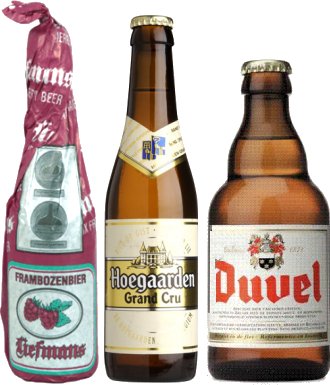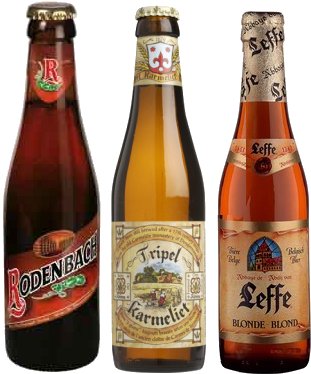 |
 |
|

|
|
|
 |

home
about
features
A-Z
books

|

|

features
|

| |
Gavin D Smith
Gavin is probably best known as an authority on Scotch whisky and brewing. He is the author of 16 books, including the Scottish Beer Bible. He contributes to a wide range of publications, and his most recent book is The
Whisky Men (Birrin, �14.99).
Famous Belgians
Supermarket beer buyers, trolleys piled high with heavily-discounted multipacks, might be forgiven for thinking that Belgian beers began and ended with the ubiquitous Stella Artois. The reality, however, is very different.
Belgium is one of the great beer producing and beer consuming countries of the world, and has been a major player on the world brewing stage since the Middle Ages. It produces beers in a remarkably diverse range of styles,
and beer is an extremely important part of Belgian culture and heritage, woven into the very fabric of the kingdom.
Indeed, Belgian gastronomy may not be as well-known as the haute cuisine of France, but Belgian cuisine � la bi�re is a treat for anyone visiting the country to sample its brews at first hand.
In 2003 there were 115 breweries operating in Belgium, producing more than 450 different varieties of beer, and a record 6.7million hl of that was sold abroad. The Belgians export nearly half of all the beer they brew.
|
|

|
Good news for the British aficionado is that a wide variety of Belgian beers are now within relatively easy reach. Most supermarkets stock at least a basic selection of interesting Belgian beers, and any independent retailer
worth his salt should be able to introduce you to a wider and more eclectic range. An increasing number of clubs and bars also sell draft Belgian beers.
Former Philadelphia beer magazine publisher, writer and gastronome Jim Anderson now owns and runs The Anderson Hotel in Fortrose, north-east of
Inverness. The Anderson boasts one of the largest selection of Belgian beers in the UK, currently stocking 67 in bottled format and offering several on draught.

|
|
"Belgian beer is the bridge between beer and wine," declares Anderson. "I get people who are wine drinkers, who don't usually drink beer in here, and if you offer them a drop of Framboise or something similar
on draught they inevitably love it. A Belgian fruit beer is a wonderful way of overcoming a one-dimensional view of beer."
Anderson observes that Belgians are a very independent-minded people: "There's lots of creativity, they're
very individualistic and happy to experiment with whacky stuff. There's a far wider range of flavours in the family of Belgian beers than in the whole of wine."
A few decades ago Belgium still had 1000 breweries - more per capita than any other nation. Even with 70 per cent of Bnow out of business, the diversity of Belgian beer is one of its strengths.
|
So just what is Belgian beer?
Red beer
'Speciality' beer styles include what may be termed 'Red Beer'. Principally produced by Rodenbach at Roeslare in West Flanders, this is brewed from red barley, along with maize and grits. The end result is a beer that is quite sharp, even sour, due to the lactic acid present. It is fruity and decidedly thirst-quenching.
The Rodenbach brewing operation dates back to 1836, and young beer is vatted with beer that has spent 18 months maturing in large oak vats. Old beer is also sometimes bottled as highly prized Grand Cru.
White beer
'White Beer' is wheat beer, 'witbier' or 'bi�re blanche' in French, with the name relating to its pale colour. The witbier heartland is Flanders and Brabant, and the best-known example is Hoegaarden, brewed in the Brabant town of Leuven. This is really a revived beer style, almost dormant before Pieter Celis began brewing it in Hoegaarden in 1966. The first written reference to brewing in the town dates back to 1318, and the style has been much imitated, both in Belgium and beyond, having achieved great international popularity. Today Hoegaarden is owned by InBev, and other notable examples of the style include Blanche de Namur and Dentergems Witbier.
Witbier is brewed using malted barley and raw wheat, with the addition of spices, most notably coriander and orange peel. The result is a cloudy beer that is spicy and fruity on the nose and palate.
Lambic beer
Sometimes know as 'wild beer', Lambic is brewed without the addition of cultured yeast, and is unique to the Senne Valley, west of Brussels. Described by writer Brian Glover as "one of the most primitive beers brewed on earth," Lambic has its origins in farmhouse brewing operations and is made from at least 30 per cent unmalted wheat. During production it is left exposed to the air to allow wild yeasts in the atmosphere to bring about fermentation.
Lambic is an extremely dry, tart, quite acidic flat beer, and to give it wider appeal, young Lambic is often blended to make gueuze, which comprises one-third old beer and two-thirds young. The secondary fermentation caused by blending gives Gueze a Champagne-like sparkle.
Fruit beer
Perhaps the most distinctive of all Belgian brews are the fruit beers made with Lambic. 'Kriekbiers' include cherries, which stimulate secondary fermentation, and help to balance the characteristic sourness of the Lambic, imparting an almond character, while Framboise is made by adding raspberries to Lambic. The result is a complex and beguiling beer in which sweet and sour characteristics blend beautifully in the best examples. The Oudenaarde firm of Liefmans, which dates back to the 17th century, is one of the best-known practitioners of the fruit beer art, along with Lindeman's, Timmerman's and InBev's Belle-Vue brand.
Trappist and Abbey beers
Belgium is known throughout the world for its Trappist and 'Abbey' beers, and Cistercian monks have brewed in Belgium since the Middle Ages. Six monasteries in Belgium still brew their own beers in situ, namely Achel, Chimay, Orval, Rochefort, Westmalle and Westvleteren, with Chimay being the biggest and best-known (see p?).
Trappist beers are strong, complex, spicy and top-fermented, with some yeast added at bottling for secondary fermentation. However, the term Trappist can only be applied to the six monastic breweries in Belgium (and one in Holland). All commercial breweries producing beers in this style are obliged by law to use the term 'Abbey' beers, though some operate under licence from religious authorities. The most readily available of the 'Abbey' genre is InBev's Leffe brand.
Best supermarket Belgians
Though specialist shops can open up a fantastic world of Belgian beers, the next time you push your trolley along the supermarket aisles take a moment to look beyond these silver and red cans of Stella. Even here there's a host of Belgian taste sensations waiting to be discovered.
Duvel
8.5% ABV, 330ml
A top fermented, golden ale; bottle-conditioning causes a very dense head to develop during pouring. Yeast and sugar are added at bottling to promote bottle fermentation, and there is a hint of yeast on the nose, together with floral, fruit and spice notes. A big, complex beer in the mouth, excellent hop and sweet malt balance. "One of the three best beers in the world," according to Jim Anderson.
�1.50, Asda, Majestic, Sainsbury's, Tesco, Waitrose and independent retailers.
Hoegaarden Grand Cru
8.5% ABV, 330ml
Best of the selection of Hoegaardens on offer in Britain is the Grand Cru. Considerably stronger than the 'regular' Hoegaarden, which is the most popular wheat beer in the UK, Grand Cru offers a rich, spicy, malty nose, well balanced on the palate with toffee, yeast and citric notes. Hoegaarden is sweeter than many wheat beers, so try it with a slice of lemon in the bottom of the glass.
�1.65, Oddbins, Sainsbury's, Tesco and independents.
Tripel Karmeliet
8.0% ABV, 330ml
A 'three grain' Abbey beer, brewed by Bosteels using wheat, barley and oats, and based on a 17th century recipe from the old Carmelite monastery of Dendermonde. Blonde/orange in colour, malt peaches and bananas on the nose. Herbal hoppiness, sweet and spicy in the mouth. A fine example of the 'tripel' style.
�1.79, Sainsbury's and some independents.
La Chouffe Blonde Ale
8% ABV, 750ml
A strong, pale 'farmhouse' bottle-conditioned ale, lightly spiced with coriander and brewed by Brasserie d'Achouffe, which was founded in 1982 near Bastognie in the Ardennes highlands. A complex beer with yeast and spice on the nose, and nutmeg and cinnamon notes on the palate, which is also quite phenolic.
�3.65, Sainsbury's and some independents.
Leffe Blonde
6.6% ABV, 330ml
Leffe Blonde and Bruin are what might be termed 'entry level' Belgian beers in the Abbey style, but are of high quality, and have the virtue of being very easy to obtain. Blonde is golden in colour, with a dense, creamy head. Fruity, spicy, and fresh on the nose. The fruits and spices continue in the mouth, where they are balanced by sharp hop notes.
�1.35, Asda, Majestic, Morrisons, Sainsbury's, Tesco and independents.
Liefmans Frambozen
4.5% ABV, 375ml
Reddish brown in colour, made with a Flemish brown ale as its base. Raspberry nose with cough medicine tones. Sherbet in the mouth, intense raspberry and treacle balance, with a suggestion of lemon. Big bodied for the style. Less sickly-sweet than some examples of the genre, with a welcoming and enduring tartness.
�2.29, Asda, Morrisons, Sainsbury's and independents.
Liefmans Kriekbier
6% ABV, 375ml
Very like a Kriek Lambic in character, but, as with the Frambozen above, made with Flemish brown ale as its base rather than Lambic. Damsons and cherries with vanilla and almond notes on the nose. Effervescent, sherbet character, beguiling sweet and sour blend on the palate where marzipan makes a fleeting appearance. Ultimately very dry and winey. A complex grown-up beer. Certainly an acquired taste, but great fun acquiring it. A classic.
�2.29, Asda, Sainsbury's, Waitrose and independents.
Pauwel Kwak
8% ABV, 330ml
Produced by Bosteels, this is an amber beer brewed with liquorice root. Wheat, spice and vanilla on the nose. Effervescent, vanilla and citrus fruit on the slightly phenolic palate. Sweet notes towards the finish balance the overall dryness.
�1.60, selected branches of Unwins, specialist beer shops, www.beersofeurope.co.uk
|
|
home
about
features
A-Z
books
|

